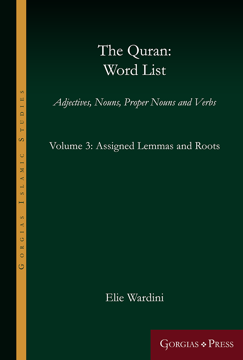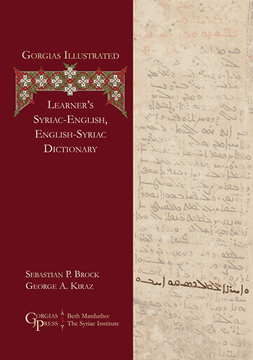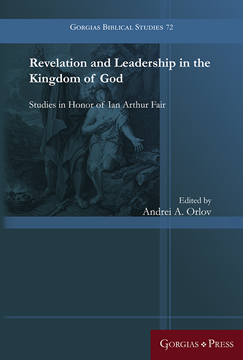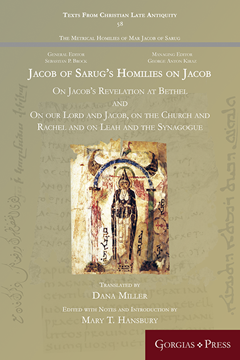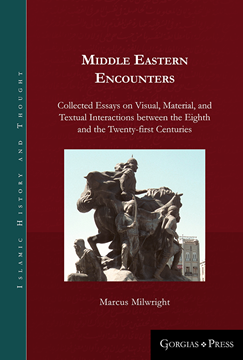Word List (Volume 3)
Adjectives, Nouns, Proper Nouns and Verbs
By Elie Wardini
Series:
Gorgias Islamic Studies 14
ISBN:
978-1-4632-4177-3
The aim with the present series, The Quran: Word List, is to present every word form in the Quran as raw data with as little interpretation as possible. The digital text used for this purpose is the Uthmani text of the Tanzil Quran Text. In volumes one and two each attested word form in the Quran is listed alphabetically with no parsing and no alteration. These are listed by word form < lemma < root. Volume three consists of two sections. In section one, the lemmas assigned to each attested word form are listed. In section two, the assigned roots are listed. In assigning each word a root and lemma, Classical dictionaries and Quran commentaries, as well as modern Quran dictionaries have been consulted.
$123.00 (USD)
The Quran. Word List. 3 vols. - Bundle
ISBN:
978-1-4632-4179-7
This collection brings together the three volumes of Elie Wardini's The Quran: Word List. The aim of these volumes is to present the Quran as raw data with as little interpretation as possible. The digital text used for this purpose is the Uthmani text of the Tanzil Quran Text. In volumes one and two each attested word form in the Quran is listed alphabetically with no parsing and no alteration. These are listed by word form < lemma < root. Volume three consists of two sections. In section one, the lemmas assigned to each attested word form are listed. In section two, the assigned roots are listed. In assigning each word a root and lemma, Classical dictionaries and Quran commentaries, as well as modern Quran dictionaries have been consulted.
*Please note, no additional discounts apply to this bundle. The price quoted below is the lowest price.
$285.00 (USD)
Gorgias Illustrated Learner's Syriac-English, English-Syriac Dictionary
Series:
Gorgias Handbooks 46
ISBN:
978-1-4632-4180-3
The Gorgias Illustrated Learner's Syriac English, English-Syriac Dictionary is both a convenient academic resource and a door into the world of Modern Literary Syriac. With 13,000 entries drawn from the major existing works, alongside dozens of explanatory boxes on biblical, historical, theological, liturgical, cultural, as well as grammatical topics, and over 80 colored illustrations, it is a practical tool for those that wish to access all but the most specialized Classical Syriac texts.
$48.00 (USD)
Revelation and Leadership in the Kingdom of God
Studies in Honor of Ian Arthur Fair
Edited by Andrei A. Orlov
Series:
Gorgias Biblical Studies 72
ISBN:
978-1-4632-4185-8
The essays collected in Revelation and Leadership in the Kingdom of God intend to honor Professor Ian Arthur Fair, a distinguished biblical scholar and leader in Christian education, known for his groundbreaking research on the Book of Revelation and church leadership. Scholarly contributions included in the Festschrift mirror Fair’s own scholarly interests, including biblical studies, with particular attention to the New Testament apocalyptic traditions, philosophy of missions, theology of worship, history of the Restoration movement, and modern theology. The content of the Festschrift thus closely follows Fair's own spiritual and scholarly journey and also reflects the breadth and scope of his influence on the church and the academy.
$135.00 (USD)
Jacob of Sarug's Homilies on Jacob
On Jacob’s Revelation at Bethel and On our Lord and Jacob, on the Church and Rachel and on Leah and the Synagogue
Translated by Dana Miller; Edited with Notes and Introduction by Mary T. Hansbury
Series:
Texts from Christian Late Antiquity 58
ISBN:
978-1-4632-4189-6
Recognized as a saint by both Chalcedonian and non-Chalcedonian Christians alike, Jacob of Sarug (d. 521) produced many narrative poems that have rarely been translated into English. Of his reported 760 metrical homilies, only about half survive. Part of a series of fascicles containing the bilingual Syriac-English editions of Saint Jacob of Sarug’s homilies, this volume contains two of his homilies on Jacob. The Syriac text is fully vocalized, and the translation is annotated with a commentary and biblical references. The volume is one of the fascicles of Gorgias Press’s Complete Homilies of Saint Jacob of Sarug, which, when complete, will contain all of Jacob’s surviving sermons.
$38.00 (USD)
Middle Eastern Encounters
Collected Essays on Visual, Material, and Textual Interactions between the Eighth and the Twenty-first Centuries
Series:
Islamic History and Thought 21
ISBN:
978-1-4632-4193-3
This book focuses on interactions between the Islamic world and other regions from the late eighth to the twenty-first centuries. Some chapters consider the complex relationship between Islam and the cultures of Late Antiquity in the Middle East and Mediterranean basin. The reprinted chapters in this volume have been revised and updated. Topics include relief-moulded pottery production in Raqqa, the construction of palaces in Samarra, portraiture in Arabic manuscript painting, written descriptions of patterned marble in medieval Islam, images of Muslim rulers in early Modern printed books, and the broadcast of the medical examination of Saddam Hussein. Also included are a critical introduction that considers the challenges involved in the study of cultural interactions between Islamic and non-Islamic regions, a cumulative bibliography, and a previously unpublished study of recently discovered photographs, drawings, and writings relating to the Middle East made by soldiers during and after World War I.
$177.00 (USD)
